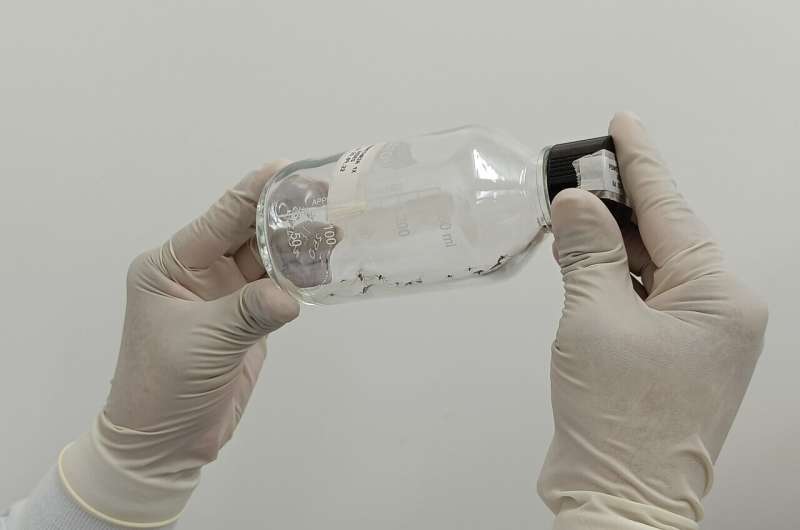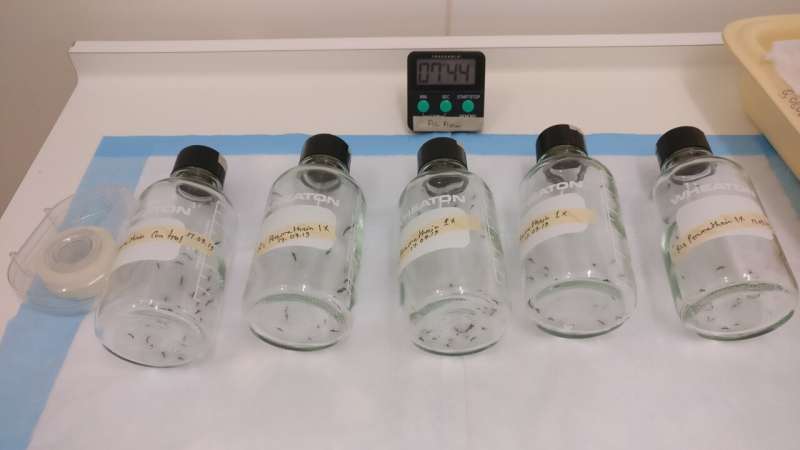This article has been reviewed according to Science X's editorial process and policies. Editors have highlighted the following attributes while ensuring the content's credibility:
fact-checked
peer-reviewed publication
proofread
Insecticide resistance is compromising control programs against dengue fever in Bangladesh, study shows

A study published in Pest Management Science reveals that insecticide resistance is severely undermining efforts to control the mosquito Aedes aegypti—the primary vector of dengue fever in Bangladesh.
The research, conducted by an international team of scientists, highlights the urgent need for sustainable and effective strategies to combat the growing dengue burden in the country.
Dengue fever is a major public health concern in Bangladesh, where the absence of effective drugs or widely available vaccines makes vector control crucial.
However, despite implementing insecticide-based interventions, the country witnessed its worst dengue outbreak in 2019, with over 101,000 cases of hospitalization. The study suggests the presence of high levels of insecticide resistance among Ae. aegypti populations may have contributed to the escalating dengue burden.
The research team, led by Hasan Mohammad Al-Amin, a Ph.D. student under supervision of Associate Professor Gregor Devine at the Mosquito Control Laboratory, QIMR Berghofer Medical Research Institute, Australia, examined the intensity and mechanisms of resistance to commonly deployed insecticides in Dhaka, the capital city of Bangladesh.
Their findings revealed that Dhaka Ae. aegypti colonies exhibited extremely high levels of resistance to pyrethroids, a class of insecticides commonly used to target the mosquito species. The research forms part of Al-Amin's Ph.D. project.
Speaking to SCI about the implications of this resistance for dengue control, Dr. Devine said, "The use of pyrethroids in Dhaka is no longer effective, and the control program needs to switch to a different approach."

Guidance published in 2016 by the World Health Organization (WHO) recommends that where resistance to an insecticide is confirmed, the intensity of the resistance should be determined. Acting upon this recommendation, the team exposed samples of mosquitoes to increasingly higher doses of the insecticides and monitored the mortality rate—using a technique known as a CDC bottle bioassay.
"These doses do not correspond with recommended field rates. However, they give a comparative measure of the strength of the resistance and help determine whether the efficacy of the insecticide in the field is likely to be compromised," Al-Amin explained.
To assess the real-world implications, the researchers exposed free-flying mosquitoes from Dhaka colonies to standard applications of pyrethroid aerosols at WHO recommended rates in an experimental free-flight room where mosquitoes can exhibit their natural behaviors. A large proportion (up to 74%) of the mosquitoes survived the exposure.
Speaking about the results of the study, Al-Amin commented, "The level of insecticide resistance in Dhaka Ae. aegypti ascertained by my bioassay experiments is undoubtedly compromising the operational control of Ae. aegypti in the city. This was emphasized by my experiments on free-flying mosquitoes under semi-field conditions, and the demonstration of significant survival following exposure to domestic and public health formulations."
The researchers established that this resistance has evolved as a result of point mutations in the nerve cells of Ae. aegypti, which are the target site of the pyrethroid insecticides. Dr. Devine explained, "Due to the mutations, insecticides cannot bind to the target site and the mosquitoes remain protected." The team also found a metabolic mechanism of resistance where certain enzymes detoxify insecticides in the mosquitoes.

The study serves as a wake-up call for policymakers, public health officials, and control programs to collaborate on developing comprehensive and sustainable approaches to combat insecticide resistance and control Dengue vectors effectively in Bangladesh.
However, Al-Amin notes that new strategies will take time to implement:
"Understandably, a considerable time will be required to adopt a different intervention. During this interim time, we recommend using a non-pyrethroid insecticide class for mosquito control."
Possible alternatives include the insecticides malathion and bendiocarb, which are qualified for application as outdoor space spray and indoor residual spray, respectively. Ultimately, a non-insecticidal approach will be needed to control Aedes-borne diseases in Bangladesh.
One possible approach is deliberately infecting Ae. aegypti populations with the bacteria Wolbachia, which has been shown to significantly reduce dengue virus transmission. As a part of his thesis, Al-Amin has done this for an Ae. aegypti strain from Dhaka and demonstrated its fitness and virus blocking capabilities. This work is in preparation for peer-review and publication.
Al-Amin explained, "Ultimately, implementation of a scalable and sustainable non-insecticide-based approach like the release of disease-refractory Wolbachia-infected mosquitoes will be required for dengue management."
More information: Hasan Mohammad Al‐Amin et al, Insecticide resistance compromises the control of Aedes aegypti in Bangladesh, Pest Management Science (2023). DOI: 10.1002/ps.7462
Journal information: Pest Management Science
Provided by Society of Chemical Industry


















